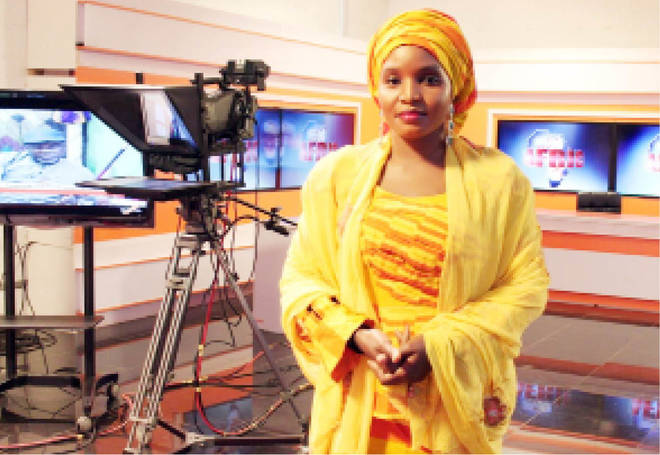
Amina Yuguda recently won the BBC World News Komla Dumor Award which was set up back in 2014 to celebrate and honour African talent. The Gotel Television presenter is the second Nigerian to win the award, after Didi Akinyelure, the 2016 winner. We cornered the young journalist for an interview, wherein she spoke on her experiences on the job, and more.
Daily Trust: You won the BBC World News Komla Dumor Award. How would you describe the feeling of winning?
Amina Yuguda: I would describe the feeling as ecstatic. If you consider all the hurdles I had to scale through to win, then it makes the award even more prestigious. It was open to the whole continent. Africa is huge and I’m sure the number of journalists considered was huge. Every time I remember I emerged on top, it humbles me. And I’m glad merit still counts for something today. I will always remain grateful to the BBC. I do not believe I’m better than anyone, but one thing is for sure, I am different.
DT: As a journalist, how have you been able to play your part as a voice for the people?
Amina: I have always told stories of the underrepresented in society. Anyone who knows the kind of reports I have done will tell you instantly, I like to tell stories of the poor, the downtrodden, and inspirational stories too. I believe as journalists we have the power to change the world by refocusing attention to problems in society. We really can help change government policy, and attitudes, if we invest in our art.
DT: What have been the challenges you have encountered as a female journalist from the North?
Amina: The major one I have noticed would be the glass ceiling for women. Also, the struggle to maintain a work/life balance. Broadcast Journalism is very demanding and time-consuming. If you don’t manage your time well it could drain you totally. But the upside is you are doing work that could help change lives.
DT: In what ways has the award impacted your career so far?
Amina: It has opened a lot of doors for me and the opportunities keep coming. I chaired the Royal African Society’s annual lecture at SOAS University in London in October. That was a great opportunity for me. I have always loved scholarly pursuits. It was wonderful for me to meet and interview professors and top academics from all over the world at the event. I also met some of the biggest businessmen and policy makers at the Financial Times Africa Summit in London.
DT: What has been the most memorable part of your journalism career so far?
Amina: I think the most memorable is yet to come. I am still quite young, so I do not want to write off the future. I will always cherish all the people I meet in the course of my work. They allow me tell their stories. Opening up to me, confiding in me, and giving me permission to share with the rest of the world. That’s a really special relationship.
DT: You are currently doing a placement programme with the BBC. What is the experience like?
Amina: Very insightful. I believe every opportunity is one for me to learn from. I have been learning so much from everyone here. The pool of resources is exceptional. The working environment is one of the best for a journalist anywhere in the world. The future is in Africa. Considering our demographic advantage, Africa is gaining a lot of attention globally. The BBC is blazing the trail, true to form forging ahead of any speculators by investing in the continent and I think that is a remarkable thing.
DT: Who are you inspirations?
Amina: My mother, my first teacher in life and all of the teachers I have had all my life. They have molded me into the woman I have become. My father, a man of principle. He understood me better than anyone else. I remember having conversations with him as he drove me and my sisters to school. He always spoke to me without patronizing me. By his example, I learnt the social skills to help me thrive in Journalism. His Excellency Atiku Abubakar, a true statesman. He has provided countless opportunities for young Nigerians to excel in work and business. Dr. Mohammed who has always supported me in everything I do and encouraged me to achieve more. Mr. Oloko, my Literature in English teacher who introduced me to Shakespeare. Wole Soyinka, Chinua Achebe, Ola Rotimi and many other literary giants. Malam Raji, my IRK teacher and moral instructor. Dr. Barnabas Lukas Jauro, a wonderful teacher and exceptional human being. Dr. John Ngamasa, Mr Humwashi Wonosikou, a true father figure and boss, and Alhaji Muhammad El-Yakub, a great leader. The list is quite endless and I apologize for the names not mentioned here.
DT: What advice would you give young female journalists like yourself?
Amina: Never give up. On this path, your feet will become weary of the countless hurdles you will have to jump. You will find also many naysayers drawing you back, suppressing your aspirations. The only advice I have for you is to stay true to yourself and never give up. This profession will drain you, it will test you with what could be the worst day of your life, but you must never stand down.

 Join Daily Trust WhatsApp Community For Quick Access To News and Happenings Around You.
Join Daily Trust WhatsApp Community For Quick Access To News and Happenings Around You.


